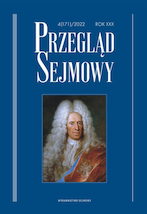Quo vadis Britannia? Davida Hume’a rozważania nad angielską konstytucją
Quo vadis Britannia? David Hume’s consideration on the English constitution
Author(s): Tomasz TulejskiSubject(s): Law, Constitution, Jurisprudence, Constitutional Law
Published by: Kancelaria Sejmu
Keywords: Hume; constitution; English constitution; conservatism
Summary/Abstract: The reign of the Hanoverian dynasty was a period of stability and prosperity in Great Britain, until the 1770s. The perfect symbiosis between the Whig oligarchy and the Crown was the cause of exceptional political stability. During this period, however, there were also neither major constitutional disorders nor sophisticated systematic analyses. According to the author, the most important attempt to describe British political mechanics is the political reflection of David Hume. David Hume, the most eminent British philosopher of the 18th century, is the author of an original and penetrating analysis of British political institutions. Arguing without regard to party sympathies, he broke down Whig and Tory conceptions of political systems, and instead proposed a dynamic vision of Great Britain’s political system, from its past as a barbarian monarchy, through a civilised monarchy, to a mixed modern monarchy. He sees this evolution as a dialectical struggle between power and liberty, the two most important forces that govern political systems. This article presents an attempt to reconstruct Hume’s coherent constitutional theory based on historical, political, and philosophical aspects of his argument. According to the author, all three perspectives form a coherent argument that makes Hume one of the classics of English constitutionalism. The author develops these ideas on the basis of a detailed analysis of Hume’s works, starting with the History of England.
Journal: Przegląd Sejmowy
- Issue Year: 2022
- Issue No: 4
- Page Range: 163-187
- Page Count: 25
- Language: English, Polish

